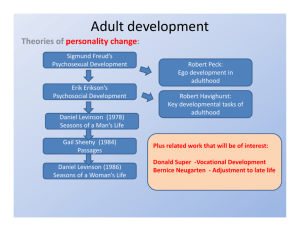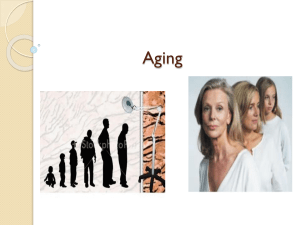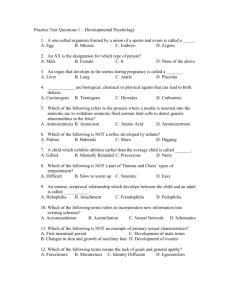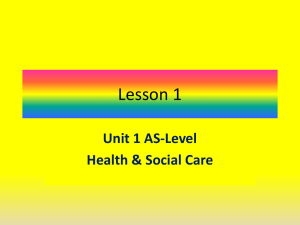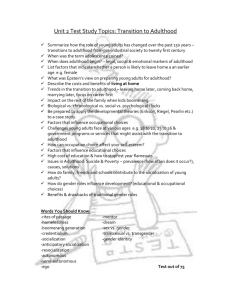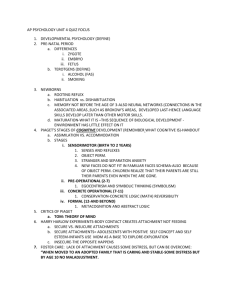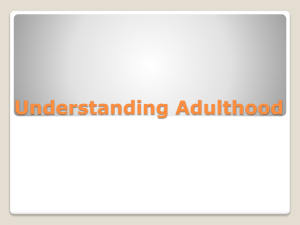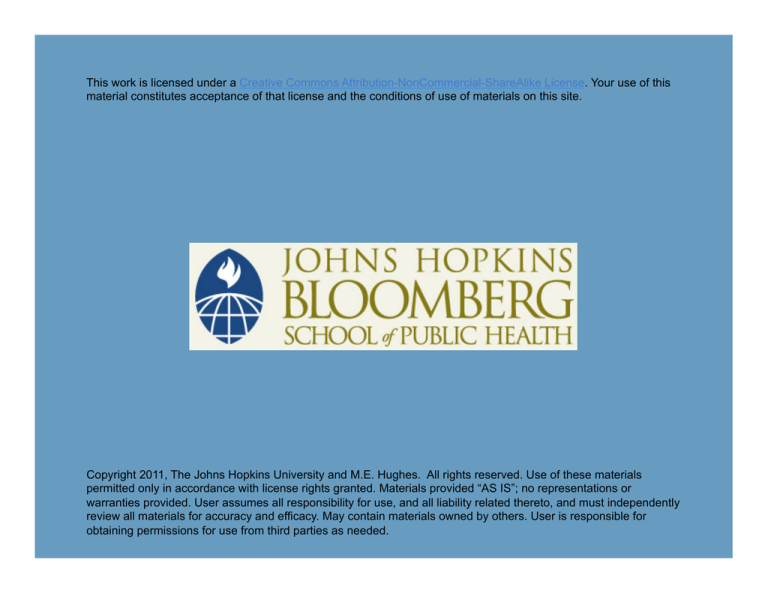
This work is licensed under a Creative Commons Attribution-NonCommercial-ShareAlike License. Your use of this
material constitutes acceptance of that license and the conditions of use of materials on this site.
Copyright 2011, The Johns Hopkins University and M.E. Hughes. All rights reserved. Use of these materials
permitted only in accordance with license rights granted. Materials provided “AS IS”; no representations or
warranties provided. User assumes all responsibility for use, and all liability related thereto, and must independently
review all materials for accuracy and efficacy. May contain materials owned by others. User is responsible for
obtaining permissions for use from third parties as needed.
Health in Adulthood
M. E. Hughes, PhD, MA
Johns Hopkins University
Section A
There’s Life after Adolescence
What Makes an Individual an Adult in Your Culture?
Are you an adult? Do you feel like an adult?
4
Overlapping Definitions of Adulthood
Legal and administrative
- Driving age, statistical definitions
Biological
- Puberty
Psychological
- Identity, intimacy
Social
- Roles: spouse, parent, worker
5
Adulthood from a Life Course Perspective
Emphasizes roles and statuses that constitute full membership in
society—“social maturity”
- Problematic if roles and statuses are not universal in a society—
e.g., marriage and parenthood in the U.S.
- Also, if roles and statuses aren’t constant in an individual’s life,
e.g., marriages can end by death or divorce
6
Working Definition
Ages 25–65
- Transition to adulthood usually defined as ages 18–30
- Age 65 is arbitrary; used in the U.S. and other nations to define
onset of “old age”; reflects conventions based on entitlements
Do we need an exact definition?
- Convenient for statistical comparisons
7
Adult Development—Recent Concept
Traditionally, emphasis on “alpha and omega” of life
Not surprisingly, development is rapid early in life, many health
concerns in later life
Adulthood viewed as norm, destination
Adult issues studied, but separately, not as life course stage
Either too little change or too much variation to understand as stage
8
The Life Span
9
Themes in Adult Development
Pace slows down
Relative importance of social increases
10
Themes in Adult Development
Pace slows down
Relative importance of social increases
Gains vs. losses
Conflict among competing goals
Generativity
Heterogeneity
11
Global Adulthood
Emphasis in adult development literature on Western cultures for
the most part
Social changes due to globalization have altered the adult life
course in both developed and developing nations
12
Domains of Adult Development
Social
Psychological
Biological
13
Social Pathways through Adulthood
Sequences of social roles
- Worker
- Spouse or partner
- Parent
And social statuses
- Socioeconomic standing
- Consumer
14
Characteristics of Social Pathways
Transitions
- Job changes
- Residential mobility
- Marriage, divorce, remarriage
- Children growing up
Trajectories
- Cumulative advantage/disadvantage
Turning points
15
Key Aspects of Adult Social Life
Family
16
Key Aspects of Adult Social Life
Family
Work
17
Key Aspects of Adult Social Life
Family
Work
Others
- Geographic mobility
- Friendships, social networks
- Civic participation
- Leisure
- Consumption
- Trauma
18
Psychological Development in Adulthood
Cognition
Emotions
19
Biological Development in Adulthood
Reproduction
- Women: cycles, pregnancy, menopause
- Men: andropause?
Declines in physical function
- Avoiding acceleration of declines
- Balancing losses with gains (including those in other domains)
20


